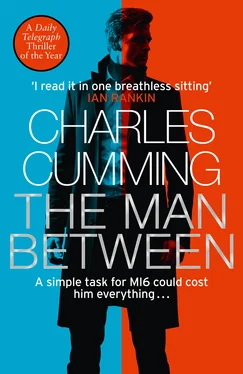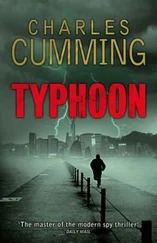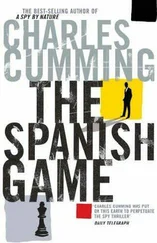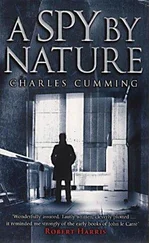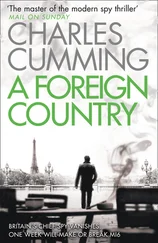‘Oh, that’s right. You said.’ He crossed his legs. ‘What about your father?’
Carradine wondered how much Mantis knew about William Carradine. A rising star in the Service, forced out by Kim Philby, who had given his name – as well as the identities of dozens of other members of staff – to Moscow. Surely somebody at Vauxhall Cross had told him?
‘He doesn’t know.’
‘And your mother?’ Mantis quickly checked himself. ‘Oh, I’m so sorry. Of course …’
Carradine’s mother had died of breast cancer when he was a teenager. His father had never remarried. He had recently suffered a stroke that had left him paralysed on one side of his body. Carradine made a point of visiting him regularly at his flat in Swiss Cottage. He was his only surviving blood family and they were very close.
‘I haven’t told anybody,’ he said.
‘Good. So nobody has been made aware of our chat in the street?’
‘Nobody.’
Carradine looked more closely at his interlocutor. He was wearing pale blue chinos and a white Ralph Lauren polo shirt. Carradine was reminded of a line judge at Wimbledon. Mantis’s hair had been cut and his beard trimmed; as a consequence, he no longer looked quite so tired and dishevelled. Nevertheless, there was something second-rate about him. He could not help but give the impression of being very slightly out of his depth. Carradine suspected that he was not the sort of officer handed ‘hot’ postings in Amman or Baghdad. No, Robert Mantis was surely lower down the food chain, tied to a desk in London, obliged to take orders from Service upstarts half his age.
‘Let me get straight to the point.’ The man from the FCO made deliberate and sustained eye contact. ‘My colleagues and I have been talking about you. For some time.’
‘I had a feeling our meeting the other day wasn’t an accident.’
‘It wasn’t.’
Carradine looked around the room. The flat was exactly the sort of place in which a man might be quietly bumped off. No record of the meeting ever happening. CCTV footage from the lobby conveniently erased. Hair samples hoovered up and fingerprints wiped away by a Service support team. The body then placed inside a thick plastic sheet – perhaps the one covering the sofa – and taken outside to the car park. Should he say this in an effort to break the ice? Probably not. Carradine sensed that Mantis wouldn’t find it funny.
‘Don’t look so worried.’
‘What’s that?’
‘You look concerned.’
‘I’m fine.’ Carradine was surprised that Mantis had failed to read his mood. ‘In fact, it did seem a bit odd to me that a serving intelligence officer would talk so openly about working for the Service.’
‘Good.’
‘What do you mean “good”?’
‘I mean that you obviously have sound instincts.’ Carradine felt the plastic rippling beneath him. It was like sitting on a waterbed. ‘You obviously have an aptitude for this sort of thing. It’s what we wanted to talk to you about.’
‘Go on.’
‘You have a Facebook page.’
‘I do.’
‘The other day you were asking for tips about Marrakech. Advertising a talk you’re doing at a literary festival in Morocco.’
Despite the fact that C.K. Carradine’s Facebook page was publicly available, he experienced the numbing realisation that the Service had most probably strip-mined every conversation, email and text message he had sent in the previous six months. He was grateful that he hadn’t run the name ‘Robert Mantis’ through Google.
‘That’s right,’ he said.
‘Get much of a response?’
‘Uh, some restaurant tips. A lot of people recommended the Majorelle Gardens. Why?’
‘How long are you going for?’
‘About three days. I’m doing a panel discussion with another author. We’re being put up in a riad.’
‘Would you be prepared to spend slightly longer in Morocco if we asked?’
It took Carradine a moment to absorb what Mantis had said. Other writers – Somerset Maugham, Graham Greene, Frederick Forsyth – had worked as support agents for the Service at various points in their careers. Was he being offered the chance to do what his father had done?
‘There’s no reason why I can’t stay there a bit longer,’ he said, trying to make his expression appear as relaxed as possible while his heart began to pound like a jungle drum. ‘Why?’
Mantis laid it out.
‘You may have noticed that we’re somewhat stretched at the moment. Cyber attacks. Islamist terror. Resurrection. The list goes on …’
‘Sure.’ Carradine felt his throat go dry. He wanted to take a sip of water but was worried that Mantis would see his hand shaking.
‘Increasingly, things fall through the gaps. Agents don’t have the support they need. Messages struggle to get through. Information can’t travel in the way that we want it to travel.’
Carradine was nodding. He knew that it was better at this stage to listen rather than to ask questions. At the same time he could feel his vanity jumping up and down with excitement; the flattery implicit in Mantis’s offer, coupled with the chance to honour his father’s career, perhaps even to surpass his achievements, was hitting a sweet spot inside him that he hadn’t known existed.
‘We had a station in Rabat. It was wound up. Folded in with the Americans. Manpower issues, budgetary restrictions. I’m sure I don’t have to tell you that all of this is strictly between you and me.’
‘Of course.’
‘I have a desk responsibility for the region. I need to be able to put somebody in front of one or two of our agents out there, just to reassure them that they’re a priority for London. Even though that may not be entirely the case.’
Mantis flashed Carradine a knowing look. Carradine was obliged to return it in kind, nodding as though he was on intimate terms with the complexities of agent-running.
‘I’m afraid it would require you to go to Casablanca as well as Marrakech. Ever been?’
Carradine had heard that modern Casablanca was far removed from the romantic image of the city conjured by Hollywood: a crowded, choking industrial conurbation entirely devoid of charm and interest.
‘Never. But I’ve always wanted to check it out.’
He set the mug of water to one side. In the distance Carradine could hear the sound of sirens, the familiar background soundtrack to life in twenty-first-century London. He wondered if Redmond had already been found and could scarcely believe that within hours of witnessing her kidnapping, he was being offered a chance to work as a support agent for the Service. It was as though Mantis was handing him an opportunity to prove the courage that had so recently been found wanting.
‘Can you be more precise about what exactly you need me to do?’
Mantis seemed pleased that Carradine had asked the question.
‘Writers on research trips provide perfect cover for clandestine work,’ he explained. ‘The inquisitive novelist always has a watertight excuse for poking his nose around. Any unusual or suspicious activity can be justified as part of the artistic process. You know the sort of thing. Atmosphere, authenticity, detail.’
‘I know the sort of thing,’ said Carradine.
‘All you have to do is pack a couple of your paperbacks, make sure your website and Wikipedia page are up to date. In the highly unlikely event that you encounter somebody who doubts your bona fides, just point them to the Internet and hand over a signed copy of Equal and Opposite . Easy.’
‘Sounds like you’ve got it all worked out.’
‘We do!’ Mantis beamed with his beady eyes. Carradine must have looked concerned because he added: ‘Don’t be alarmed. Your responsibilities will be comparatively minimal and require very little exertion on your part.’
Читать дальше
